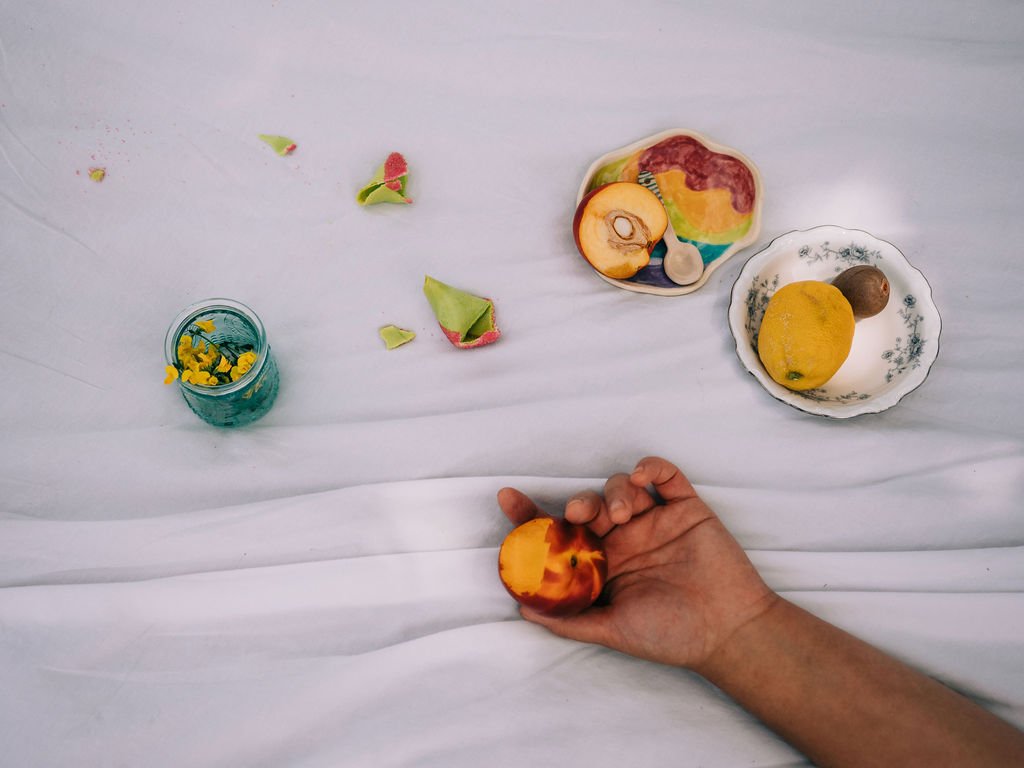This July, Kilston, a SPACE summer Storytelling and Engagement Intern with Bates Purposeful Work, sat down with artist collective, Tender Table. Based in Portland, Tender Table is an artist collective that engages with the community through storytelling and food. Tender Table is supported by a Kindling Fund Grant. Administered by SPACE, The Kindling Fund is one of thirty-two nationwide re-granting programs established by the Andy Warhol Foundation for the Visual Arts.
Kilston-T’Naya Lee: You know you guys are some pretty interesting people. I’ve done my research on you guys. So my first question is for Stacey and I wanted to know what gave you the idea to create Tender Table?
Stacey Tran: I started Tender Table in 2017 when I lived in Portland, Oregon which is where I’m from. Trump had been elected, everyone was in shock and my community reacted strongly to that, especially among women, femmes, people of color in Portland, which is a very white city. Some of us decided to have a potluck. There’s this group called Portland Creatives of Color. Anyone that does a creative thing either for work or for fun who identifies as a person of color was invited to this Facebook group. From that Facebook group people would organize smaller events, and one day we had a potluck. We were in the kitchen preparing food together and telling stories. Food would remind us of certain memories or stories that we experienced or that our families or communities experienced. When I was growing up, my parents felt it was really important to always have dinner together. That was when I would hear about how my parents’ lives were in Vietnam before they immigrated to the U.S. I learned a lot about my family history and my culture that way, and it just clicked for me that storytelling with food would be a way for me to create my full circle of community and be able to offer that in a public way. The first Tender Table event featured three storytellers who each made a dish relating to their story. The audience would listen to the stories and be invited to sample the food. That was a very typical event style that would happen monthly for a couple of years. Since moving to Maine and meeting Veronica, we’ve adapted the events to being online during the pandemic and also in person outside.
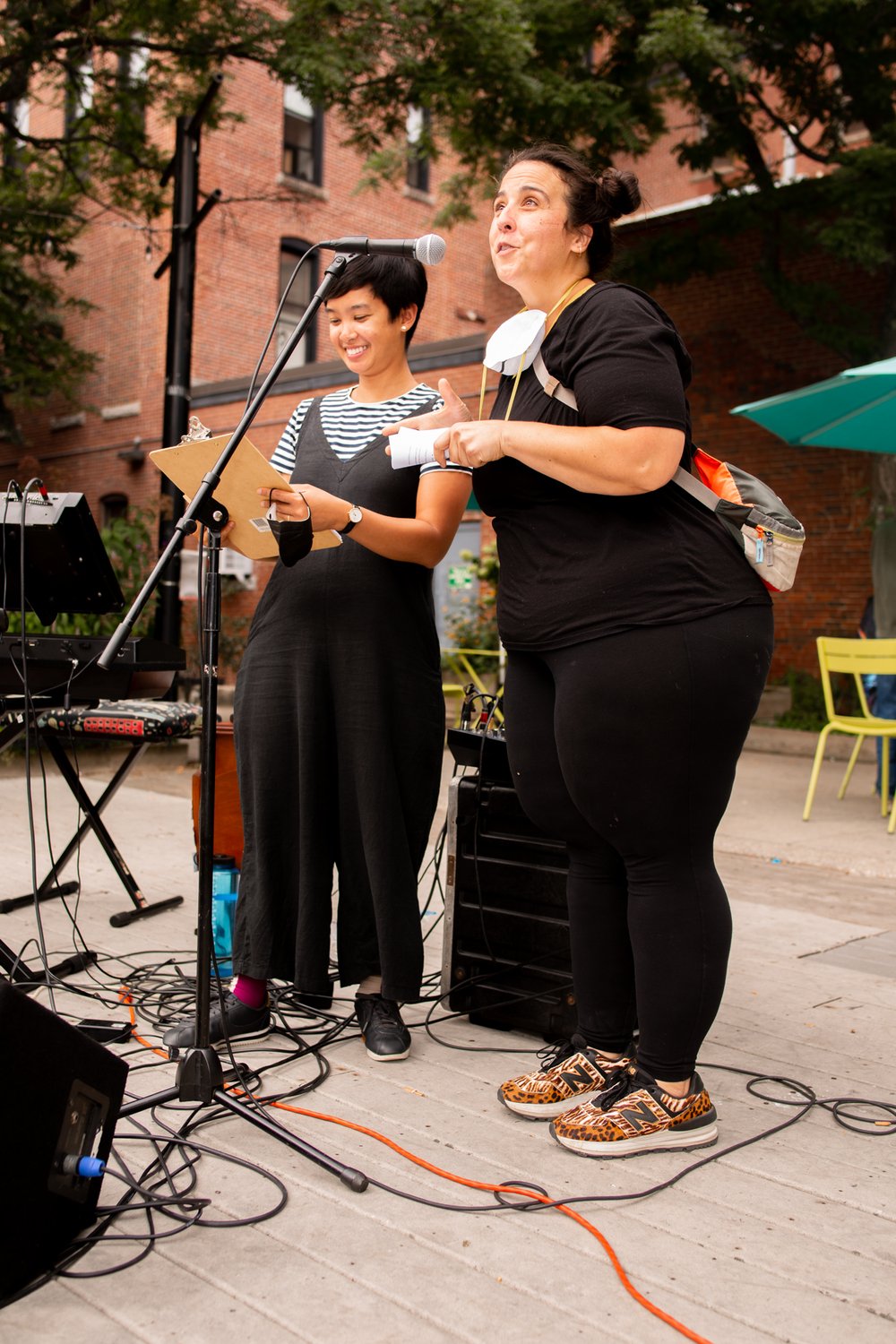
K.L.: When did you guys meet?
Veronica Perez: We were introduced in early 2020 by our friend Ashley Page who is also an artist. She has a studio here and works in Indigo Arts Alliance as the Studio Programmer. She introduced us over email as a ‘you should know about this person who works in the community’ type of email, and from there I attended the first Ramen Night event and I remember it was really special and a couple of the Tender Table members had put together these care packages of these little jellies, ramen, and a notebook and a pen and so it was just this beautiful curated box of care that had been put together. Then we all got online together and made our ramen the way that we make ramen. That was my first interaction with Tender Table and it was a space that I had never been in ever like. I’m a biracial person, my mother’s white and my father’s Puerto Rican and so I kind of had a different upbringing than Stacey had. We did eat dinner together but it was more contentious and nothing was ever really shared, so being in a space that you can be open and vulnerable around food kind of changed my relationship with food in kind of a weird way so I knew it was something that I wanted to be a part of after the first event. I don’t know if we contacted each other I can’t really remember but we started just working together and created events and that’s how I got introduced to Tender Table.
S.T: I would say it happened quickly.
V.P: It did happen quickly. It still does make a lot of sense which is really great.
K.L: When it comes to events and performances has there ever been someone who was like eating something in Maine while telling a story and like just sitting there and eating in their live performance and you just interpret that however you want?
V.P: I love that.
S.T: A visual artist based in Rhode Island named Janaya Kizzie made this fictional dessert, and then she had a whole performance where she painted on her shirt. I wish I had video recordings of these events. What were you thinking of?
V.P: I don’t know what I was thinking of cause I was gonna say that’s a beautiful idea. I love that so much and we never really had that happen in Portland yet. But I think at the food and art festival that will happen because we will be having artists there and not really sure what they’re gonna do, but there could be something at the food and art festival. We invited artists to table and sell their work and we also invited food vendors to sell their food.
S.T: I remember this one Tender Table dinner with multiple tables, four people seated at each table. After the appetizer, to move to a different table so that people would be constantly rotating through and sitting with different people throughout the dinner. I would love to do more dinner parties.
V.P: Yeah and it’s just a little difficult with COVID hanging over us right now and this summer is where we’re doing a lot of our events.
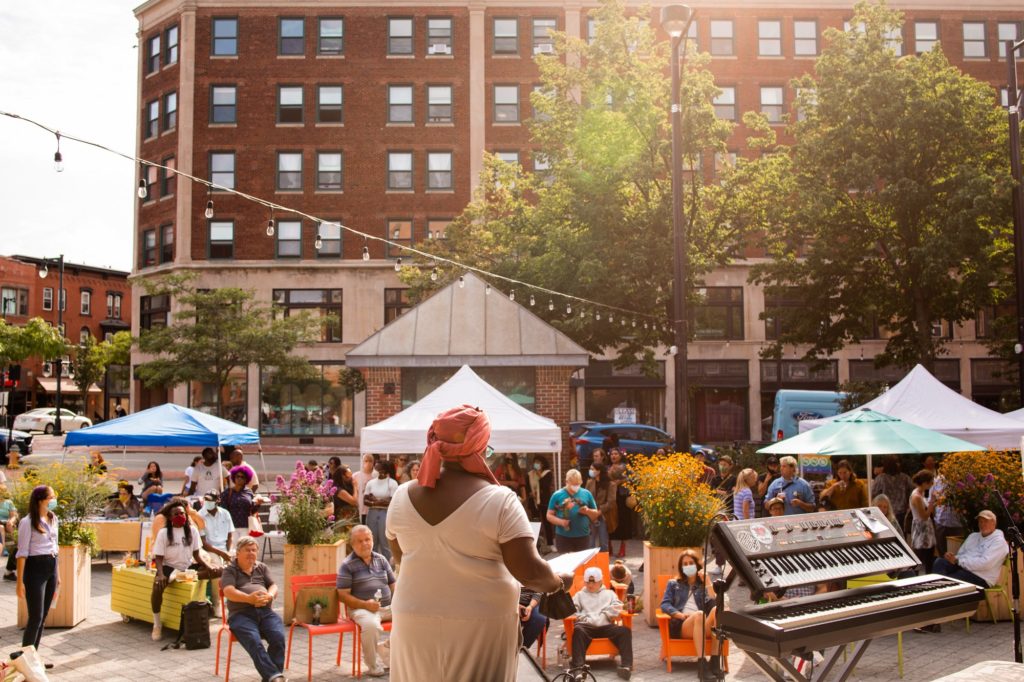
K.L: When you’re switching seats during Tender Table dinners, do you find yourself learning a lot when it comes to different ethnicities and religions when you are having these conversations?
S.T: At one of our events recently, I said, “We don’t always have to talk about race. We can talk about whatever TV show we’ve been watching. Don’t we feel tired when we talk about race? Don’t we feel tired from talking about race all the time? We are people of color who always embody that experience and think about that Now that we are all here together we can just be ourselves.”
V.P: That totally changed the whole tone of the full zoom because at the beginning of the zoom it was very heavy, very like some kind of big new story happened- cause it happens every hour on the hour now. After Stacey said that, I think it just gave everyone a chance to breathe and I think that’s an important aspect of the Tender Table, specifically the BIPOC-only event. You’re already entering with a heart of equity and inclusion. You’re already entering with certain kinds of knowledge and experiences and entering kind of like openly. The Tender Table meeting space is that it just gives you a chance to breathe.
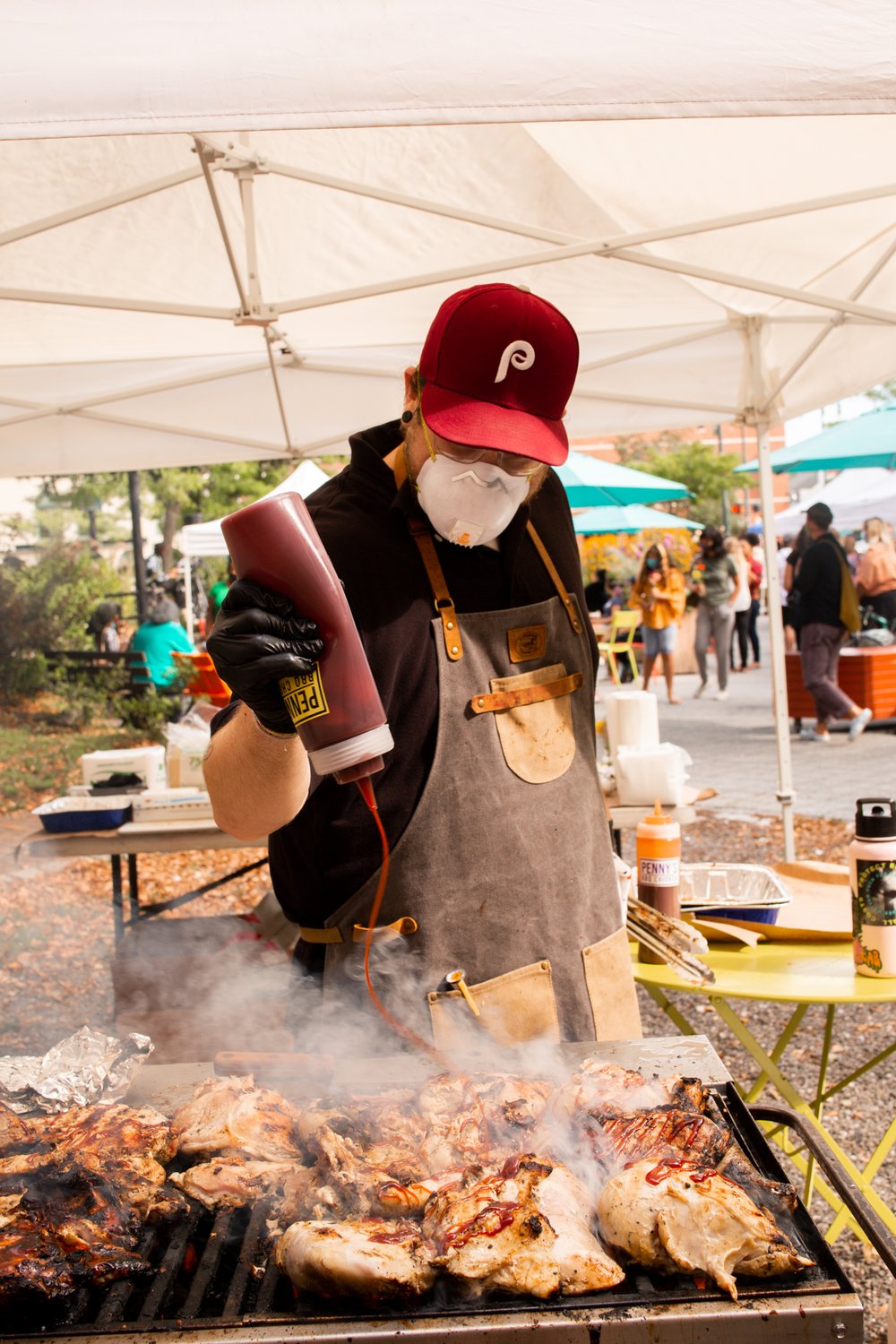
K.L: That feels so safe and comfortable. Do you guys have a headquarters or do you meet from zoom?
S.T: We don’t have a headquarters and we also like moving our events around town. We would like to move our events around the state more as we continue building relationships. Our home base for the fair has been Congress Square Park. It is such a lovely location right downtown. There’s a lot of traffic that goes by – foot traffic, car traffic, and it’s very visible and everyone is welcome there. I really love having our fair in that space.
V.P: Yeah it’s a really great local space and we don’t have a headquarters. I would like to have a headquarters, but I also like to keep the notion of what Stacey has created at Tender Table in the sense of changing the systems of having this nonprofit that is funded by rich white people that get to call the shots. I want to break the systems down and run it the way that Stacey and I would like to run it. I think that would take a little more work just because there aren’t systems set in place like that to work that point already.
S.T: I was thinking about part of your question earlier about if we see ourselves expanding to different states, and I think it’s really important for people who are living in a place to respond to the needs of their community. When I moved to Maine in 2020, I wasn’t sure if people would respond to Tender Table, and I was open to not doing ithere if people didn’t respond to it because what’s the point of doing something people don’t see the benefit of? The only reason why we are continuing Tender Table is because we’ve had such a positive response and there’s such a need for a space like that here. Honestly, it has been such an amazing way to meet people as someone who just moved here. I really appreciate the space because of everyone who has come through. Some of my deepest friendships are from Tender Table, like with you.
V.P: Awwww, I love you too.
K.L.: You are right because if you cannot recognize the problem going on in your own state that’s a problem. You guys shouldn’t have to expand in different places.
V.P: There is a community here and I have lived here for like 6 years before I found a community because I just didn’t think that there was a community that had my ideals and interest at heart so it was really difficult to find that. I do not think I’m alone when I say that either because I have heard a lot of stories from people that have gone to tender table events that have said the same thing. I didn’t even know that stuff like this existed. People are here. Tender Table gives reprieve from white-dominated spaces cause you are constantly in a space where you have to code switch or act white or do a certain thing and it’s like ‘bro can I just get a minute’ and it’s like really take a breath and really be myself because unfortunately the world isn’t going to cater.
S.T: We are making a new world.
V.P: This part of the community is really important and we are here.
K.L: Outside of Tender Table are there any projects you guys are working on?
V.P: I’m working on my braiding circles which are BIPOC centered community gatherings where you do a three strand braid and talk about identity, experience and existence and those braids become a part of a larger community sculpture. I’m working with people at the University of Southern Maine as the Artist in Residence next year. I also have a show Voices Whispering at CMCA in Rockland that goes until September 10th.
K.L: With the braiding are they like braiding they’re own hair or do they get hair to braid.
V.P: I get bundles of artificial hair and then everyone sits around kind of like a quilting circle but instead of a quilting circle we are all braiding hair and talking about stories that have to do with hair. If we have an anecdote about hair that we would like to tell that leads to these large systemic issues, it just reverberates that sentiment that the personal is political and it gives people entryways to garner empathy and understanding. But yeah we take bundles of artificial hair braids and other kinds of materials now too cause I’ve started working with different styles and then they go into a larger abstract hair sculpture.
K.L: Is it like everyone is contributing to a collective piece?
V.P: Yes. I really wanted that and it was really important to me because as an artist you get so stuck sometimes in just doing this and it seems like you are wearing blinders. You are putting coverings on your eyes or being pigeonholed and so with this kind of work I am making alongside the community. It has a more universal feeling to it which I think helps people see our work.
S.T: It’s not just the artist looking at their own belly button, navel-gazing.
V.P: That’s really funny that you say that because I think that’s why I’m so interested in Tender Table and other community events because it’s not just about me and it makes me feel better to have other people around me that are feeling the same way. You’re not alone. There’s belonging when other people resonate with something you are experiencing or thinking or feeling, you know? There’s nothing that feels better than going into a room full of people who feel similarly to you. There’s a kinship that’s created there for sure especially over food that is such a warm and steady feeling to be able to do that over food.
K.L: There’s a quote about people being tied in a garment of destiny and being interconnected.
S.T: What’s the quote again?
K.L: “Tied in like a garment of destiny.”
Veronica: That interconnection I think we have forgotten about- that is American ideals that are individualistic. We got away from that interdependency and community care realizing that we are in this together and that you can’t do this alone.
K.L: The quote was by Martin Luther King Jr actually. Stacey, do you have anything that you are working on?
S.T: Tender Table is my creative process/project. My background in poetry has led me here, as well as community organizing. At the center of both is storytelling and connection. Building relationships and finding meaning in community and belonging is at the center of my purpose of being here.
K.L: You are probably always writing poems.
S.T: I haven’t written poems since I finished grad school in 2020, but that’s a whole conversation for another time.
K.L: Do you feel like you are experiencing a creative block or it’s not your priority?
S.T: I think both. I feel satisfied with the work that I’m doing with Veronica, the community, and Tender Table. I’m not looking for the same things that I was looking for when poetry was at the center of my life. Writing poetry doesn’t feel like my primary way of expressing what I need to express. I think it’s really important as somebody who has access to using language to only use it when I have something to say. My experience as a poet has helped shape and guide me towards my values as a creative person. Poetry gave me a foundation of language and a way of seeing and noticing things that I don’t think I would be here without.
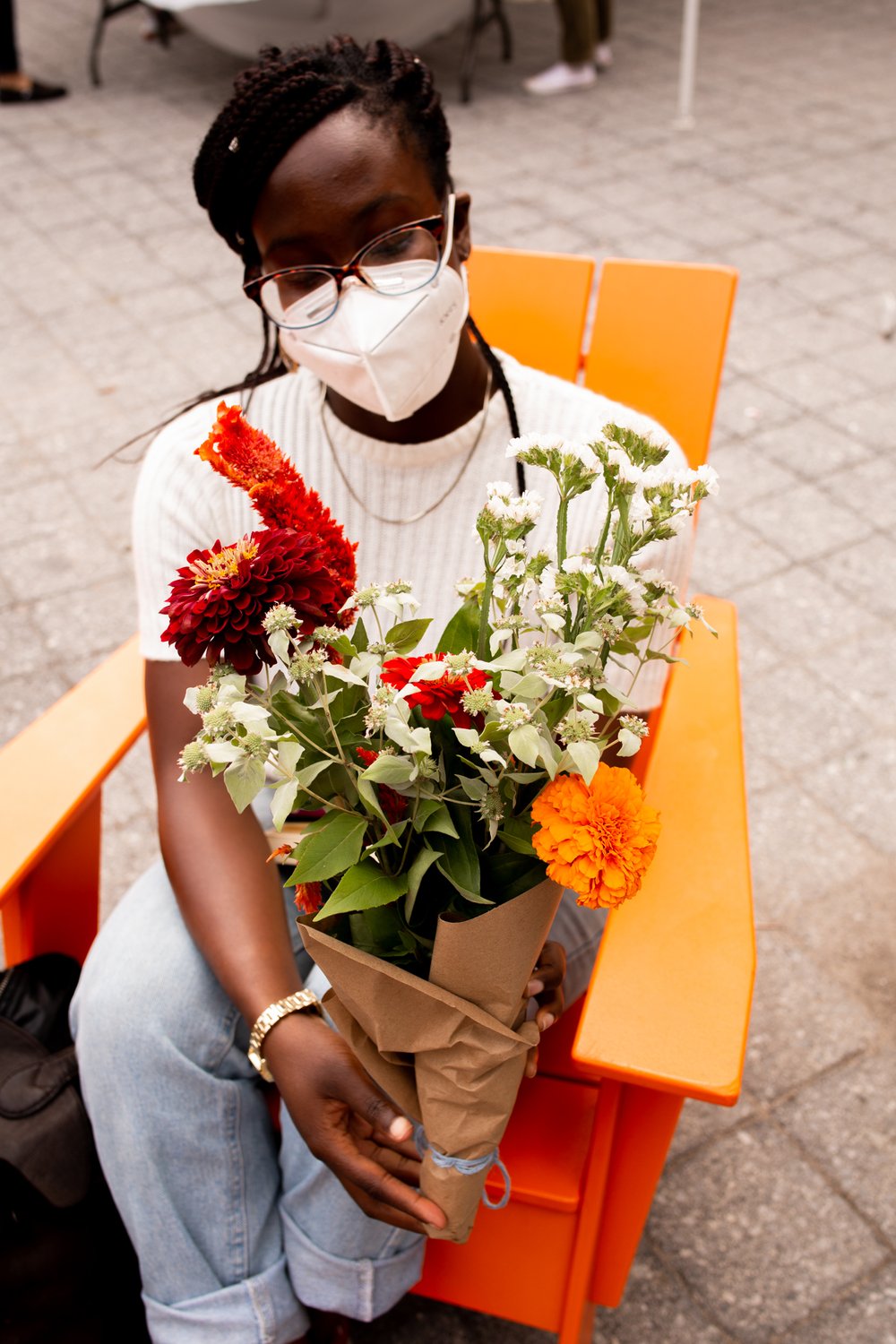
K.L: Do you ever feel like there are still changes you need to make in order to make Tender Table feel more inclusive?
S.T: I would like to collaborate more with people who I haven’t yet, and I think part of it is because of the disconnection we experienced through the pandemic, through all the grief we are going through collectively, with everything that is going on in the world, with all the continued crises that are compounding. There’s a part of me that wonders, how do we get more people here? What will draw them to Tender Table? What is keeping the people who aren’t coming to our events from coming to them?’
V.P: How can we pick someone up and facilitate that?
S.T: It would be cool to do a community survey where we talk to our community and ask them, “What do you need out of a space that’s just for people of color?”
V.P: We can sit here all day and go interact instead of being this white savior. We don’t need that, we need community care. I think it’s just being really mindful of that and I don’t think that we’ve gone into a space and kind of like taken it over.
S.T: I think some people feel comfortable coming to our events and other people may be shy. Maybe they have questions about our spaces and maybe we need to initiate those conversations.
V.P: We’ll have folks when we start the event some people will name that feeling of being shy and reserved. Can we facilitate that so the people who are nervous still have access? It is nerve-racking. I would never do that.
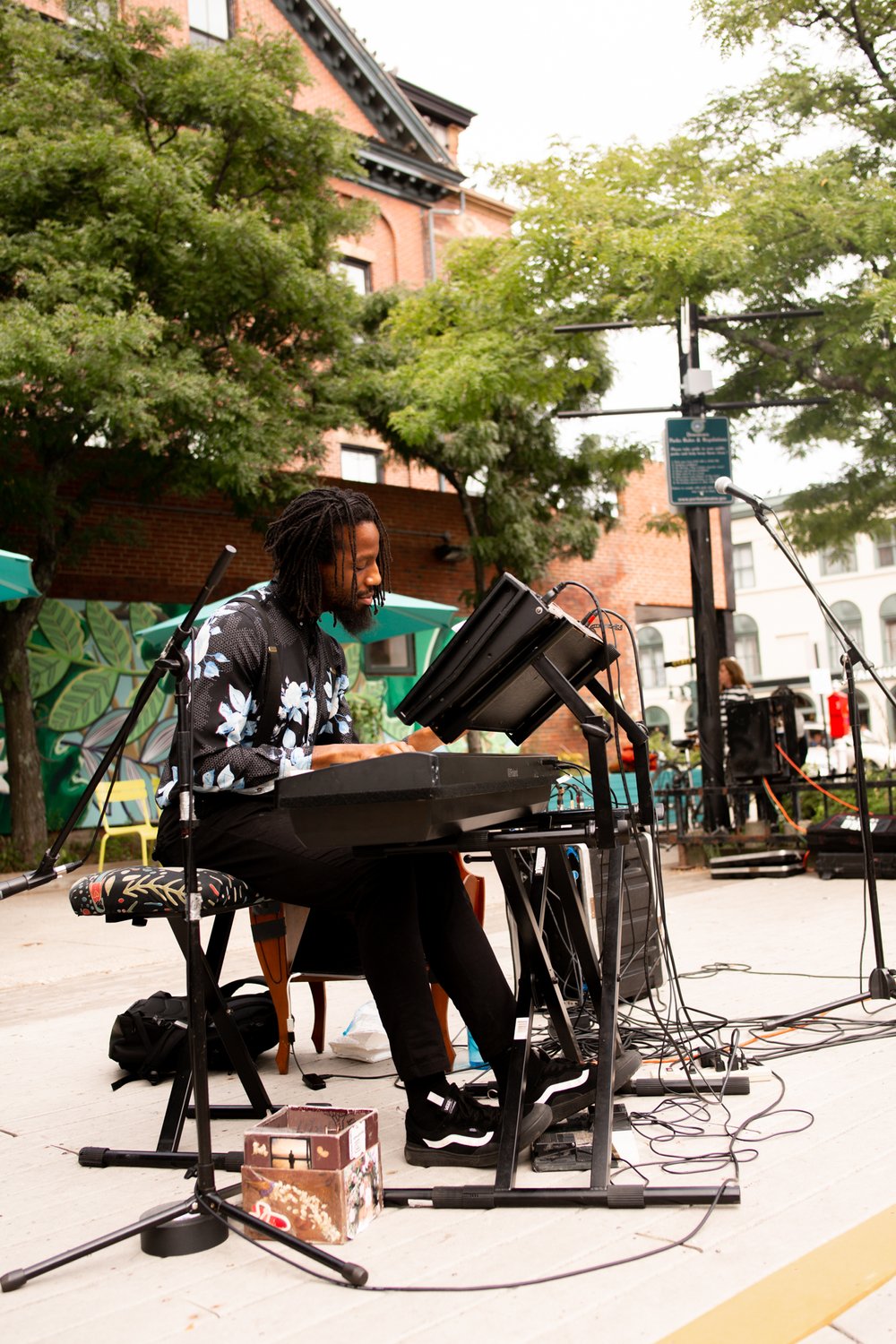
K.L: Have there been any performances that stood out to you or one that you just can’t forget?
V.P: I think for me it was the whole of the Tender Table festival last year. I don’t really know what I was thinking or expecting. It was the first time doing it and we weren’t sure on how this was gonna go. All of sudden Congress Square Park was packed with people and all of sudden my little heart grew like three feet that day. People are here, people love us, people want to support us and we want to support our community. We had poets and other people perform but I think as a whole that really touched me and showed me we are doing something.
S.T: That is the thing that we want to do for as long as we can. The turnout was outstanding, all the vendors, all the performances, all the people who showed up. The volunteers who helped us that day. It really was such a success. Such a great community turnout, people of all ages and different walks of life were there. I am really proud of us. I don’t even remember how we came up with that idea.
V.P: I think what happened was I was working with Friends of Congress Square Park because I am on the Audience Engagement Committee so we come up with different events to have and they had an open date and I had just started working with Tender Table and I think that was maybe the first thing we talked about was doing a festival or something and I was like well there’s an open date in this park and then it kind of just snowballed from there.
K.L: I saw your video on the soap back in 2012 and you also have a book Soap for the Dogs. So did you guys relate on this idea of soap?
S.T: We haven’t even talked about that yet.
V.P: That piece I made when I was still an undergrad in 2016. When did you do your soap?
S.T: I mean I’ve been writing those poems probably around the same time and then it came out in 2017, 2018.
V.P: So even before we met we were on the same wavelength, you know. I’m glad you brought that up. That’s really interesting.
S.T: But I didn’t eat my soap.
V.P: No, I did.
K.L: What was the significance behind that video if you don’t mind?
V.P: I was a little art student and I was exploring guilt through performance. I came from a very religious background, and was still trying to decipher my identity and my relationship to religion. Now looking back on it, I can say that I thought at the time a good way to pay penance for things that I had done in the past was to eat a bar of soap. I mean it was a piece that I made that contributed to a larger piece in my body of work. I think I would also like to add that being a Puerto Rican person whose father was in the diaspora in the 1970s – I think that there is shame and guilt in not knowing things I should know – if that makes sense. It is a shame around missing cultural practices and ancestral history.
K.L: How are you guys feeling? How has it been being a mom?
V.P: There are a lot of different things all of the time. Mostly, really good and really fun but really hard. With saying that, I have support around me. My job at Indigo Arts lets me bring her to work with me. They’re like ‘bring your child because it is about community’. I think it is about having people around you that can really help with that, but also terrified to raise a child right now because I want to raise them in a way that the shit going on does not affect them but it is really difficult to navigate. I was thinking about being a mom and I don’t know, I feel really lucky to have a kid right now too because I have the kind of solace in my life where there is so much shit going on but she still needs to go to the bathroom and be fed. She reminds me to take care of myself. It’s a reminder that I need to take care of this kid- not that they take over my whole life- but I need to take care of myself too. Thank you for asking that question. I do appreciate it.
K.L: How are you Stacey?
S.T: I am feeling really full. Life feels really full in a good way. I’m trying to remember what’s possible and I’m not going to move mountains overnight, but maybe with some people we can move some things in that direction. That feels really important to me. I feel energized and also tired, so resting is really important for me. I am in a place where I don’t want to schedule any more big things for myself this summer. I want to be present and enjoy what’s in front of me.
K.L: What do you think Tender Table will look like in the future?
S.T: I’m really excited about both the food fair that we’ve been planning. We hosted our first annual food and poetry fair last summer in Congress Square park. Instead of poetry this year we’re focusing on food and art. I would be really happy if the fair was our fixture every year and we do that for as long as we can. I’d love to have space the rest of the year to do other types of events and work on projects that come up. We are very lucky that people reach out to us for events. We really embrace the opportunities to collaborate with the community. We welcome invitations and ideas from other folks, which helps us continue to expand our audience and our network, and our relationships with the community of color here in Maine.
V.P: Yeah that is what I would like to see moving forward too is that we’re working on the food and art festival. I think one of our things is redistributing funds within a community and that is something that I would like to see Tender Table do in the future: changing the world we live in from a capitalistic mindset to a more of like a mutual aid mindset, and show that through this kind of work can be achieved using equity and inclusion at the forefront of everything we do.
S.T: I’m really glad you mentioned that. I think it’s really important to me that Tender Table stays organic and scrappy and not become a nonprofit organization. If we do our own thing, we have the freedom to make our own decisions without having to rely on other people helping us make that decision who might not be as engaged in the project. It’s really important that we get more serious about our fundraising and access to resources that we can redistribute to artists of color in Maine. I’ve met so many amazingly talented people who I continue to go back to to collaborate with, and I hope that more people will come to our events so that they can build relationships with those people who they might not otherwise meet. There’s no reason why we shouldn’t meet. People of color are here and there just haven’t always been spaces that are for us and by us. I feel in solidarity with organizations and groups and individuals who are already doing that work here. What we’re doing is honoring that tradition, that lineage of other artists and other organizers who are doing that work here already and have been doing it for longer than we have.
Photo Credit: Coco McCracken

